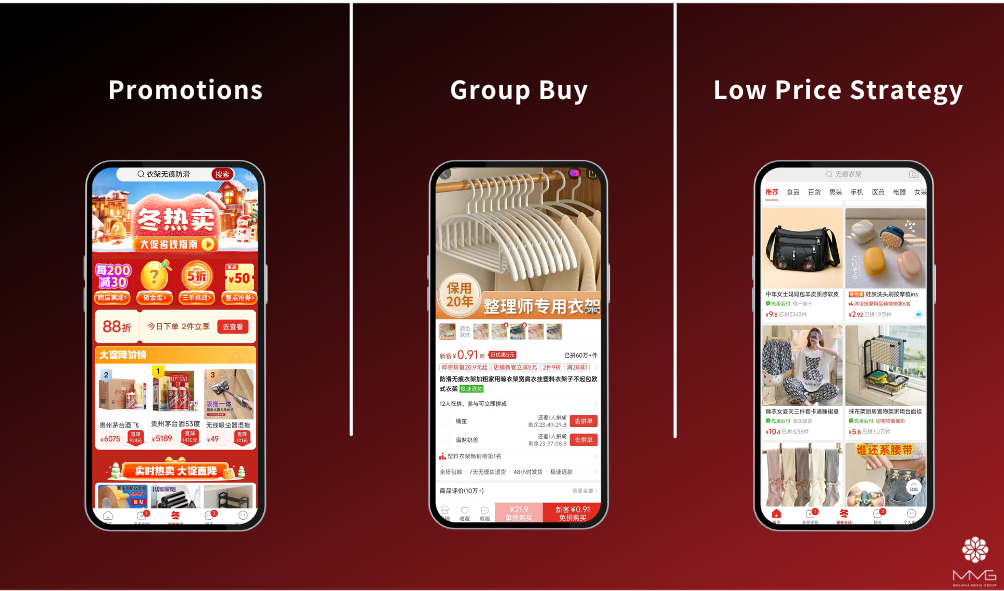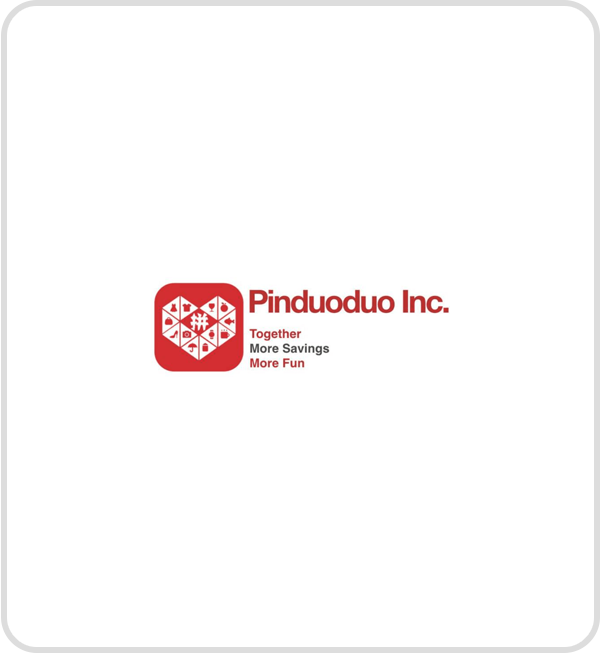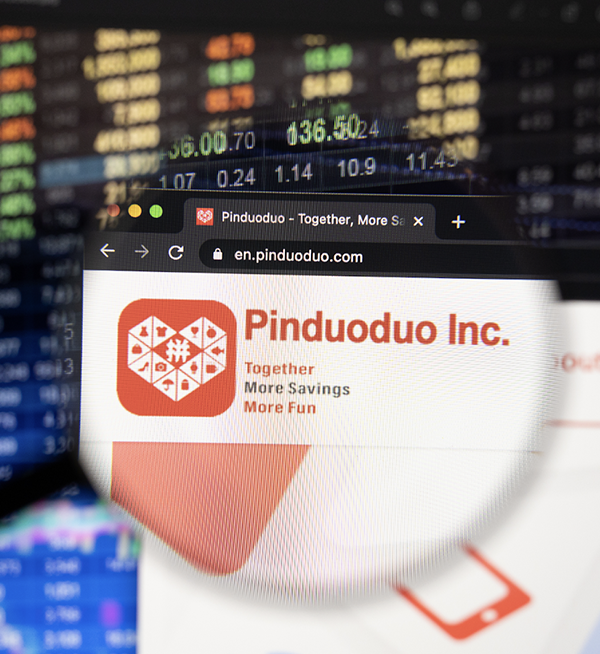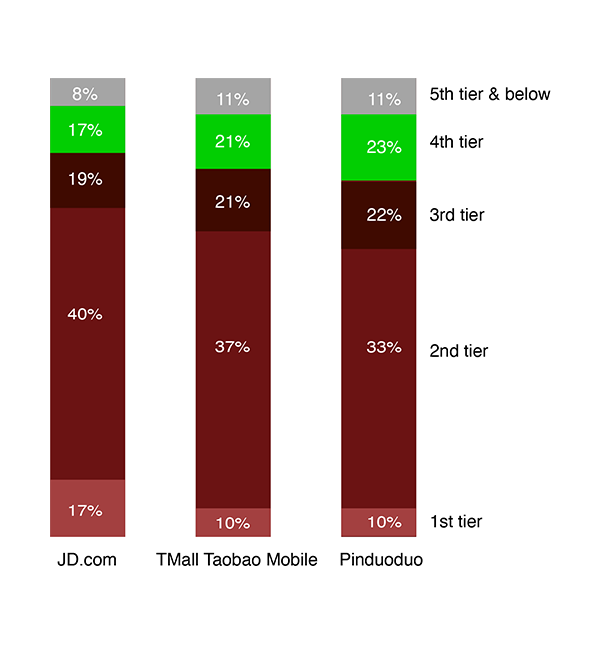Menu


Primarily used in tier-two and tier-three markets for inexpensive daily necessities. With the main feature being group purchases with friends, family, neighbors, etc., the user buys the product at a lower price.
Discover more about Pinduoduo essential information.

Pinduoduo Introduction
China is not short of e-commerce powerhouses. The online market is highly saturated; however, it is not impossible to start a social e-commerce platform as long as it offers the right solutions to the right consumers. Pinduoduo proved this, battling its way to the top next to Alibaba and JD.com.
Pinduoduo (PDD), the Shanghai-based company, raised US$1.6 billion through a U.S IPO in July 2018, which had stood out to be one of the largest deals of that year. The company claims 195 million monthly users and has managed to be successful in China’s highly competitive e-commerce space in just three years.
The Pinduoduo shopping model encourages users to share links of the purchase of items to friends and family and participate in group purchasing.
Pinduoduo is unlike many other social e-commerce platforms. The appeal that sets them apart is the group purchase function. Pinduoduo offers a wide range of products, from groceries to home appliances.

PDD features personal recommendations within the app, however, the uniqueness of Pinduoduo is the integration of “team” purchasing. Allowing users to select items or choose to participate in group buying, which then the product’s price becomes lower.
This model encourages buyers to share links of the items they are buying to friends, family, and social media circles through WeChat or QQ.
Every item on Pinduoduo allows a minimum number of buyers to complete the purchase. The platform offers a 24 hour buffer time for the group to complete its purchase. Should the buffer time not be met, the team purchase option cancels, and any money committed is refunded.
This purchasing model keeps users motivated and hooked for a more dynamic shopping experience, creating a viral sensation in China. Pinduoduo offers incentives through cash, coupon, lottery in addition to free products.
Pinduoduo offers meager prices, which is another compelling incentive for users. Their discounts go up to 90% from bed sheets to computers. The platform has daily items on sale for much lower prices. In 2018, PDD sold more than 6.4 million units of toilet paper at ¥12.9 (the equivalent to US$1.90) for ten boxes, additionally sold 4.8 million umbrellas for ¥10.3 (US1.51) per piece.


The company’s C2B models give manufacturers the ability to ship directly to their consumers, eliminating layers of distributors. This concept enables a reduction in the price tag for buyers and increases profit for manufacturers. The approach is highly effective for the sales of perishable goods such as agriculture and fresh products.
In 2019, PDD acquired 582.2 million active users, with at least one purchase per user on the platform during the year. In that same year, JD.com had 362 million, and Alibaba 711 million active users. PDD’s growth has been highly driven by its availability on China’s Tencent-owned messaging service – WeChat, which has over a billion monthly users.
WeChat is part of the country’s daily life, allowing users to make payments within the app, making it easier for consumers to access PDD through WeChat, allowing them to complete payments through the platform.
A large portion of Pinduoduo’s user base is from China’s lower-tier cities. Consumers are perhaps more price-conscious than those in the higher-tier towns, which JD.com and Alibaba dominate.
In 2019, PDD disclosed 45% of the gross merchandising value accounted for the first and second-tier cities, 55% of its GMV accounted for from the third-tier or below. GMV is the total value of orders for products and services placed on the Pinduoduo platform.

Pinduoduo Founder
Colin Huang, otherwise known as Huang Zheng, is the man behind China’s e-commerce success Pinduoduo. Huang is the third richest man in the country at the age of 41, with an estimated net worth of US$41.8 billion. Six years after establishing Pinduoduo, Huang has stepped down as chairman of this mega e-commerce platform.
During his short time as leader of PDD, Huang became an inspiration to many since debuting the company with an impressive Nasdaq IPO in 2018. PDD overtook Alibaba in the most significant number of annual customers with 788 million buyers in 2019.
Huang Zheng, born in 1980 to factory worker parents, grew up dreaming of becoming a scientist. He attended the Hangzhou Foreign Language School based on his teacher’s recommendation, later receiving his bachelor’s degree in computer science from Zhejiang University. During his first year, Huang was one of the few selected to attend Melton Foundation, an international non-profit. Later, Huang was able to travel to the U.S. for his Master’s degree at the University of Wisconsin-Madison.
Huang received his first salary at Microsoft during his internship. In 2004, he was offered a software engineering position for the then start-up Google.
Pinduoduo was not Huang’s first start-up. After three years at Google, he started his own e-commerce site, Ouku, after which he sold it for US$2.2 million in 2010. Later he founded Leqi, a website that connects foreign brands to Chinese e-commerce platforms. He also started a gaming studio, Xunmeng.
Pinduoduo was not Huang’s first start-up. After three years at Google, he started his own e-commerce site, Ouku, after which he sold it for US$2.2 million in 2010. Later he founded Leqi, a website that connects foreign brands to Chinese e-commerce platforms. He also started a gaming studio, Xunmeng.

Although Alibaba and JD.com dominated the e-commerce industry in China, in 2015, Huang decided to establish Pinduoduo, offering group deals and connecting farmers and buyers. Just after three years of PDD, Huang took the company public on Nasdaq.
The reasoning behind Huang stepping down from PDD was to make way for a new generation of leaders to take over. After working hard for years, he donated US$100 million to his alma mater, Zhejiang University, in order to support and carry on research in biomedical science, agriculture, and food.
Contact us
Due to high demand of our services, we offer only a 40-minute free consultancy session
Soi sukhumvit 39 Khlong Toei Nuea, Bangkok 10110
211 Soi Pridi Banomyong 11, Sukhumvit 71 Rd., Khwaeng Phra Khanong Nuea, Watthana, Bangkok 10110